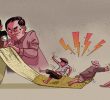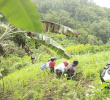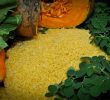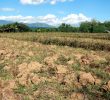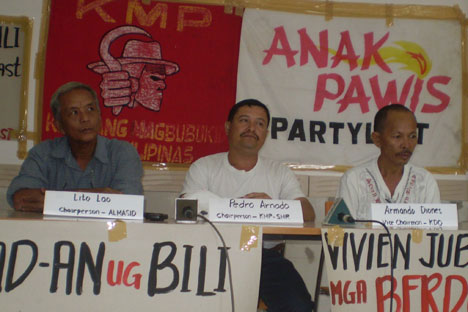
NO BAILBOND. Lito Lao, chair of farmers’ group Alyansa sa mga Mag-uuma sa San Isidro, is number one in the list of those charged with qualified theft by the Jubacs, a landlord family in Davao Oriental. His case has no bailbond. (davaotoday.com photo by Marilou Aguirre-Tuburan)
“They just told me they don’t need a court order since they own the land. They were heartless. They even had our cooking pots destroyed.” — Armando Diones, facing warrant of arrest for qualified theft.
By MARILOU AGUIRRE-TUBURAN
Davao Today
DAVAO CITY, Philippines — For peasant leader Armando Diones, to be falsely accused of theft by the family of his landlord meant he had to turn fugitive and forgo schooling for his eight children, the youngest still in the second grade.
Peasant group Kilusang Magbubukid ng Pilipinas (KMP) took cudgels of Diones and the 12 other farmers in Davao Oriental who are caught in a local struggle against what they call “landlord tyranny” and “the military’s rule of terror.”
Diones was charged with qualified theft by one Vivien Jubac, Mati town’s clerk of court and daughter of his deceased landlord, Aniceto Jubac. Twelve others were also charged. A warrant of arrest was issued against Diones and six others last April 22 for allegedly stealing coconuts from Jubac’s 10-hectare land.
According to Diones, the threat of arrest has forced him and his companions to leave their families.
“It’s too bad. How can I enroll my children when I lost our livelihood? What they did was like killing us and hurting the future of our children,” lamented Diones, a peasant of Banaybanay town and vice-chairperson of Katawhan sa Davao Oriental.
Charged were peasant leader Lito Lao and farmers Angeline Diones, Wilfredo Diones, Antonieta Diones, Leopoldo Diones, Naldo Diones, Jocelyn Dagcuta, Jesus Dagcuta, Artemia Olivar, Manuel Olivar, Eustacquio Tero and Danilo Rosalita. Their more than PHP 30,000 (USD 683.58) qualified theft case is non-bailable based on Philippine laws.
“We were dismayed with the issuance of arrest warrant against our members,” Pedro Arnado, KMP chairperson, said.
“Certainly, Vivien Jubac used her position as clerk of court to repress her family’s tenant. She’s even more daring as she has the backing of the Philippine Army’s 28th IB,” Arnado said.
KMP also scored the Municipal and Provincial offices of the Department of Agrarian Reform (DAR) in Banaybanay town and Davao Oriental province for being “inutile” as these didn’t lift a finger to help the beleaguered farmers.
DAR officials were not available for interview as of press time.
Lao and Diones said they were not able to go back to their hometowns since January and April, respectively. Others who were charged went into hiding as advocates helped in looking for competent lawyers to help them fight in this legal battle.
“Anytime we can be arrested. But we are resisting it because we are not guilty,” Diones said, adding, “We’re being charged with a criminal case even without the benefit of a substantial preliminary investigation.”
Not under CARP
KMP said the case stemmed from a dispute between the landlord siblings and their tenant Diones. Other peasants who helped Diones in his bid to keep the land were implicated in the charges.
Jubac’s 52-hectare land was supposed be distributed to his six tenants under the Comprehensive Agrarian Reform Program (CARP). Aniceto Jubac, however, negotiated with the DAR to cover only six hectares while the 10 hectares in Banaybanay town remained under his name and tilled by one of the tenants, Armando Diones. The 10 hectares were later passed on to his nine children by way of CARP’s voluntary land transfer scheme. The remaining 36 hectares are found in Mati and San Isidro towns.
KMP’s Arnado said Vivien Jubac refused to pay Diones the accumulated amount of PHP 887,000 (USD 20,527) as part of the latter’s share since 2003. Instead, Jubac evicted Diones and his family, with the aid of the police and the Army’s 28th IB currently operating in their area.
In December 2010, after the death of the patriarch Aniceto Jubac, his children Vivien and Wilfredo ordered the demolition of Diones’s house. According to Diones, the police led by a certain Raul Antipuesto and Cafgu members in Mati town aided the demolition, even without a court order.
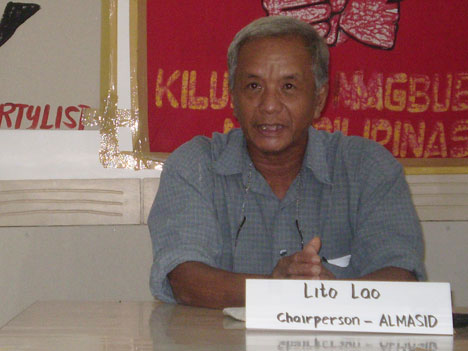
NO BAILBOND. Lito Lao, chair of farmers’ group Alyansa sa mga Mag-uuma sa San Isidro, is number one in the list of those charged with qualified theft by the Jubacs, a landlord family in Davao Oriental. His case has no bailbond. (davaotoday.com photo by Marilou Aguirre-Tuburan)
“They just told me they don’t need a court order since they own the land,” Diones recalled. “They were heartless. They even destroyed our cooking pots,” he said, adding that the incident traumatized his children.
Three months later, on March of 2011, the Jubacs hired 27 men with the police and military in tow and succeeded in evicting Diones by destroying his hut and fencing off the disputed 10-hectare farm area.
On April this year, the landlord Jubacs freely harvested the produce of Diones’ four-hectare cornfield and 7,000-squaremeter ricefield. The military’s 28th IB led by certain Sgt. Bagolbol led two 6×6 military truckload full of soldiers to aid the landlord’s hired harvesters. About 40 sacks of rice were collected.
“What they did was very painful. We tilled the lands, even shelled out my own money and what did they do? It was an utter injustice. The crops are supposedly for my family and for the families of farmers who helped me till the land,” Diones lamented.
Even as Jubacs got the crops, the family proceeded to file charges of qualified theft against Diones and 12 other peasants.
Threats, harassment against peasant leaders
Lao who heads Almasid (Alyansa sa mga Mag-uuma sa Sidlakang Dabaw) said he was surprised that he was among those charged with qualified theft by Vivien Jubac.
KMP’s Arnado condemned the AFP and the Aquino government’s counter-insurgency campaign Oplan Bayanihan, saying, the filing of trumped-up charges against farmers and peasant leaders “were aimed to suppress resistance against abusive and despotic landlords.”
Lao recalled, “I was only invited by Engineer Wilfredo Jubac to help in the appraisal of the crops produced by Diones. Now, I’m surprised that I’m number one in the list of the arrest warrant,” he said.
Lao believes it was because of his role in helping Diones that he was implicated with the charges. Jubac earlier filed cases of grave coercion, grave threat and theft against Diones, but these were dismissed. Jubac persisted, with new charges against Diones and this time with Lao and others who helped him.
He believes the criminal charge against them was intended to divert the issue (case) from land conflict and would not have to go through the Special Court.
Under the Comprehensive Agrarian Reform Law of 1988, a Special Agrarian Court covers agrarian cases whom its commissioners examine, investigate and ascertain facts relevant to the dispute, including the valuation of properties. It has the “original and exclusive jurisdiction over all petitions for the determination of just compensation to landowners, and the prosecution of all criminal offenses under this Act.”
The lawyer from DAR, according to Lao, waived from the qualified theft case filed by Vivien Jubac, because it’s a case of non-tenancy. Diones was forcibly evicted from the 10-hectare land he tilled after the Jubac family fenced it off.
“I believe they are doing this as I’m the chairman of Almasid. If they can send me to jail, they thought they can stop us from organizing our ranks,” he said.
As they gear up for a legal battle, KMP said they will bring their fight in the streets. (Marilou Aguirre-Tuburan/davaotoday.com

